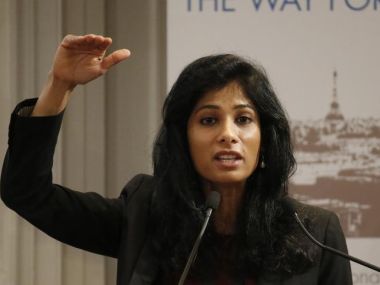The International Monetary Fund (IMF) Chief Economist Gita Gopinath said India’s much lower-than-expected GDP numbers was the single biggest drag on its global growth forecast for two years.
In a blog post on the IMF website, she said, the slight downward revision of 0.1 percent for 2019 and 2020, and 0.2 percent for 2021, is owed largely to downward revisions for India. “The biggest contributor to the revision is India, where growth slowed sharply owing to stress in the nonbank financial sector and weak rural income growth,” she wrote.
The IMF on Monday lowered India’s economic growth estimate for the current fiscal to 4.8 percent. In October, the International Monetary Fund (IMF) had pegged India’s economic growth at 6.1 percent for 2019. Listing decline in rural demand growth and an overall credit sluggishness for lowering of India forecasts, Gopinath, however, said the growth momentum should improve next year due to factors like the positive impact of corporate tax rate reduction, according to a PTI report.
#TopStory IMF cuts India's FY20 GDP growth projection by 130 bps to 4.8%,becomes 1st major agency to forecast sub 5% growth rate.Also says slowdown in India one of the key triggers for global #growth forecast cut. Details at 9pm on India Biz Hour,India's only news bulletin at 9pm pic.twitter.com/SKNWCl2XGF
— CNBC-TV18 (@CNBCTV18Live) January 20, 2020
“Global growth, estimated at 2.9 percent in 2019, is projected to increase to 3.3 percent in 2020 and inch up further to 3.4 percent in 2021,” the IMF said while releasing an update to its World Economic Outlook (WEO). Compared to the October WEO forecast, the estimate for 2019 and the projection for 2020 represent 0.1 percentage point reductions for each year while that for 2021 is 0.2 percentage point lower. India-born Gopinath said growth in India slowed sharply owing to stress in the non-bank financial sector and weak rural income growth. The country’s growth is estimated at 4.8 percent in 2019, projected to improve to 5.8 percent in 2020 and 6.5 percent in 2021 (1.2 and 0.9 percentage point lower than in the October WEO), supported by the monetary and fiscal stimulus as well as subdued oil prices, it added. 2019 refers to fiscal year 2019-20. India’s economy grew just 4.5 percent in July-September 2019 period—the weakest pace in nearly six years. The Indian government has been taking various measures to bolster growth. Emerging markets For the emerging market and developing economy group, the IMF said growth is expected to increase to 4.4 percent in 2020 and 4.6 percent in 2021 (0.2 percentage point lower for both years than in the October WEO) from an estimated 3.7 percent in 2019. “The growth profile for the group reflects a combination of projected recovery from deep downturns for stressed and underperforming emerging market economies and an ongoing structural slowdown in China,” it noted. Gopinath also said the pickup in global growth for 2020 remains highly uncertain as it relies on improved growth outcomes for stressed economies like Argentina, Iran and Turkey, and for underperforming emerging and developing economies such as Brazil, India and Mexico. Further, the IMF said the balance of risks to the global outlook remains on the downside, but less skewed toward adverse outcomes than in the October WEO. “The pickup in global growth for 2020 remains highly uncertain as it relies on improved growth outcomes for stressed economies like Argentina, Iran, and Turkey and for underperforming emerging and developing economies such as Brazil, India, and Mexico.” she said in the blog post. With trade wars weighing on exports and investment, the global economy expanded by 2.9 percent last year, its slowest pace since the global financial crisis, despite near synchronized central bank easing that added half a percentage point to global growth. “We have not reached a turning point yet,” IMF Managing Director Kristalina Georgieva said told a news conference on the eve of the annual meeting of the World Economic Forum (WEF) in the Swiss ski resort of Davos to Reuters. “The reality is that global growth remains sluggish.
“Just in the very first weeks of the new year we have witnessed increased geopolitical tensions in the Middle East and we have seen the dramatic impact that climate shocks could have. We saw them in Australia as well as parts of Africa.” The IMF now sees growth at 3.3 percent this year, below its October projections for 3.4 percent and also cut the 2021 forecast to 3.4 percent from 3.6 percent. The reductions reflect the IMF’s reassessment of economic prospects for a number of major emerging markets, notably India, where domestic demand has slowed more sharply than expected amid a contraction of credit and stress in the non-bank sector. The IMF also said it marked down growth forecasts for Chile due to social unrest and for Mexico, due to continued weakness in investment. The Fund said that an easing of tensions between the United States and China, which had stunted GDP growth in 2019, had boosted market sentiment, amid “tentative” signs that trade and manufacturing were bottoming out.


)
)
)
)
)
)
)
)
)



